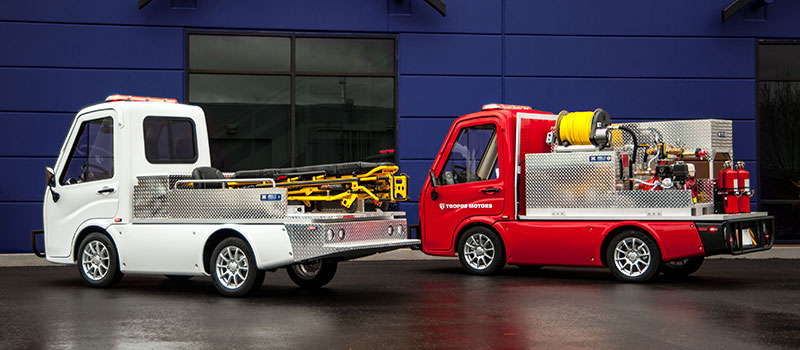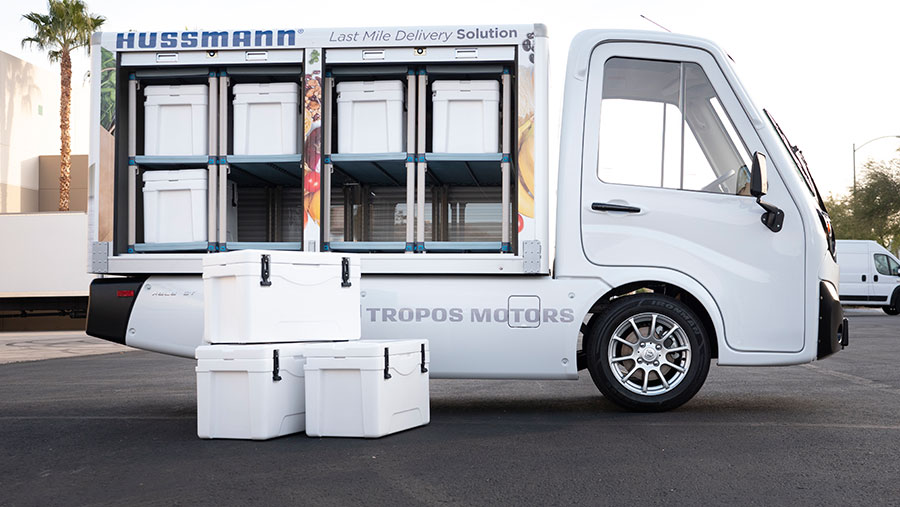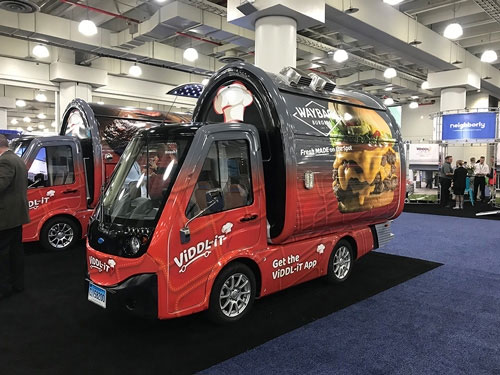Electric emergency vehicles: Tropos Motors shows how to start small

January 19th, 2020

Tropos Motors mini electric emergency vehicles
Silicon Valley–based Tropos was at CES because it’s the launch partner for a new OneConnect global platform from Panasonic, aimed to help penny-pinching fleet managers easily keep track of electric work vehicles and their battery efficiency—to assess short- and long-term vehicle health, as well as overall cost and return on investment.
Tropos has done demonstrations at many corporate campuses, in Silicon Valley and elsewhere (including Apple) and while it can’t say who’s agreed to buy the trucks yet, it will say a number of college campuses are using them—and an unnamed rocket company.
One of the selling points is that the vehicles are a big step beyond the golf-cart-based vehicles that campuses or corporations might be considering. CEO John Bautista, who was formerly the engineering director at Zero Motorcycles, told us that the suspension and brakes are all automotive-grade. “So even though we’re restricted by NHTSA to a 3,000-pound gross vehicle weight rating, we can go well beyond that,” he said.
Tropos is essentially an upfitter, and its vehicles are based on a chassis from China’s Cenntro Automotive Corporation—one that Bautista says has already been approved for going up to 80 km/h (50 mph) on European roads. In the U.S. they’re considered low-speed vehicles (LSV) and limited to 25 mph. The Renault Twizy, which we drove in San Francisco a few years ago as the Scoot Quad, would be one such example.

Tropos Motors electric refrigerated vehicles
Bautista says that they can outfit vehicles for private-road use that are good for up to a 2,000-pound payload capacity and a 3,500-pound towing capacity. “Where that’s important, like this vehicle you see here, is that emergency response is not restricted by NHTSA laws,” he said.
Tropos has about 15 different payload packages, including food delivery and food preparation—and even a dump truck with a 7.5- by 4.5-foot-wide bed with a 1,300-pound capacity and hydraulic lift.
“We try to make this a real working truck,” he said. “What we’ve targeted is what we call the right-sizing market—bigger than the golf carts and ATVs, smaller than full-size trucks that carry many of their essentials.”

Tropos Motors mini electric food truck for Wayback Burger
Other projects from the company have included a fully electric mini food truck for Wayback Burger, and a Connected Last Mile Refrigeration Cargo vehicle that fits vacuum insulation panel coolers—incorporating a technology that saves energy versus existing cooled cargo systems and has no additional energy draw on the truck’s battery system.
Tropos also has fully electric emergency medical response EVs that are small enough to fit on a walking path.
Batteries range from a base 8.6-kwh AGM (lead-acid) pack, to keep the price point low, to 13-kwh and 26-kwh lithium-ion packs. The lithium-ion packs include Level 2 (J1772) charging while the base plug is proprietary. The trucks are rear-wheel drive, with a 13-hp (10-kw) AC synchronous motor that’s geared very low for torque multiplication and the low 50-mph top speed.
The base price of the trucks is $14,950. Bautista claims that the closest competition is $900 more, and it comes with no windows, doors, heater, backup camera, Bluetooth, or radio—all things that are included in the Tropos Motors truck. It’s also selling low ownership costs as part of the package—and assuring that by having a parts warehouse in the U.S. A windshield is just $300 to replace, and a mirror is $25, and there’s also a knowledge base for dealers and distributors that has everything they might need to troubleshoot and fix.
The company, which is angel-funded by Yuqing Xu, a co-founder of Webex (which was sold to Cisco), has delivered about 200 vehicles, with orders for another 550, and it anticipates being able to deliver in the thousands in 2020.
Bautista says that the company is already moving on to developing its next-generation vehicles. “Obviously OneConnect is a big part of it," he explained. "I think that information that an end user, fleet operation, or owner can gather from the vehicles and their fleet is really, really powerful for them, and being able to more efficiently utilize the tools that they have.”
And just maybe, eventually, fire officials will allow a truly all-electric fire truck. Bautista lamented that the truck shown still needed to use gasoline for the engine-powered water pump, as firefighters want to be able to quickly siphon gasoline from other vehicles.